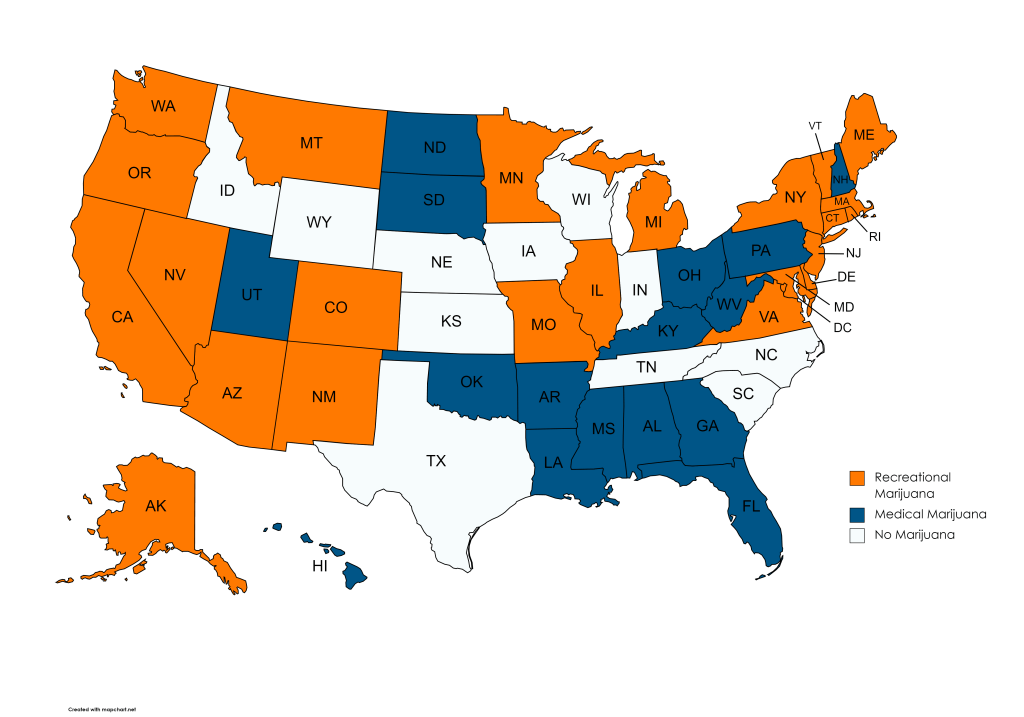
2023 Workplace Drug Testing Laws Employers Should Know About
In this post, we provide an overview of the current laws and information surrounding workplace drug testing and resources to help employers keep their workplace safe and compliant.
Understanding the Purpose:
Workplace drug testing serves various purposes, including promoting employee safety, preventing drug-related accidents, ensuring productivity, and maintaining a drug-free work environment.
Voluntary and Mandatory State Laws For Drug Testing
Voluntary drug testing laws authorize employers to test certain employees for drugs with their consent. Mandatory state laws require employers to have a legitimate reason to conduct a drug test, and the employee must consent before the test is conducted.
Types of Drug Tests:
- Several types of drug tests are commonly used, including urine, saliva, hair, blood, and breath alcohol tests. A drug test panel describes the drugs included in the drug test, which may contain one or several drugs.
- Drugs included in a panel may depend on the following:
- Applicable state law requirements or limitations.
- Federal regulations.
- Type of work performed by those being tested.
- Drug test method (lab-based vs. rapid-result).
- In some cases, corporate policy or culture.
- Each test has its advantages and limitations regarding detection period and accuracy. Employers typically choose the testing method based on the specific needs of their industry, legal requirements, and the nature of their workforce.
Federal Laws and Regulations:
Drug-Free Workplace Act of 1988: This federal law requires certain federal contractors and grantees to maintain a drug-free workplace. Employers covered under this act must implement a written drug-free policy, provide employee education, and offer assistance programs for employees struggling with substance abuse.
Department of Transportation (DOT) Regulations: 49 CFR Part 40 – Procedures for Transportation Workplace Drug and Alcohol Testing Programs. The DOT has specific drug testing regulations for safety-sensitive employees in transportation industries, including aviation, trucking, railroads, public transit, and maritime. These regulations include pre-employment, random, post-accident, reasonable suspicion, return-to-duty, and follow-up drug testing.
State-Specific Laws:
One of the most significant challenges in navigating workplace drug testing laws lies in the variations between states. Each state has the authority to establish its rules and regulations, which can significantly impact drug testing practices. Some states have comprehensive drug-testing statutes, while others have limited or no specific laws, relying on general employment and privacy laws instead.
Key aspects that may differ between states include:
- Permissible Testing Circumstances: States may have different rules regarding when employers can conduct drug tests, such as pre-employment, random, post-accident, or reasonable suspicion testing.
- Written Policies: Some states require employers to have a written drug testing policy in place before conducting any tests.
- Employee Protections: Certain states provide protections for employees who test positive for drugs, such as requiring employers to offer rehabilitation programs or other forms of support.
- ADA and Accommodations: The Americans with Disabilities Act (ADA) prohibits discrimination against individuals with disabilities. Employers should be aware of their obligations to accommodate employees who are undergoing treatment for substance abuse.
- Medical and Recreational Marijuana: With the increasing legalization of medical and recreational marijuana, some states have enacted protections for employees who use marijuana outside of work hours. Employers should be aware of these protections and adjust their drug testing policies accordingly.
- Employee Education:Providing employees with comprehensive information about drug testing policies, procedures, and the potential consequences can help foster a drug-free workplace culture.
Employee Rights:
Employees have certain rights when it comes to workplace drug testing. These include the right to privacy, the right to be free from discrimination based on disability or medical conditions, and the right to due process. It is essential for employees to understand their rights and be aware of any applicable state-specific laws that protect them.
States that have legalized medicinal marijuana – what it means for employers
The workplace is changing rapidly in light of marijuana legalization, and employers must stay up to date on the applicable laws. Employers who don’t adapt their drug testing policies to comply with local law may face costly repercussions – including allegations of discrimination or other violations. Drug testing for marijuana use should be done only when necessary and consistent with applicable state laws.
Where permitted by state law, employers should ensure that any drug testing they conduct is job-related and consistent with business necessity. Employers should also regularly review their substance abuse policies to ensure they reflect current legal realities, particularly as changes occur in state law. Employment decisions based on an individual’s status as a medical marijuana user or recreational user should be carefully considered before implementation. When in doubt, employers should consult with counsel to ensure compliance.
Marijuana Legalization Map Updated June 2023

Staying Informed:
It’s crucial for employers to stay up to date with the latest changes in drug testing laws and regulations at both the state and federal levels. Consult with legal counsel, monitor official government websites, join industry associations, and subscribe to relevant newsletters to ensure your company remains compliant with all applicable laws.
Remember, this overview serves as a general guide, and it’s essential to consult with legal counsel to ensure your specific workplace drug testing policies comply with the most current laws and regulations.
Additional Resources:
- SAMHSA – Drug Testing Resources.
- Current Consulting Group – Expert Drug Testing Industry Consultants.
- Quest – Employment Drug Testing and Screening.
- FMCSA – DOT drug and alcohol testing rules.
About Astrix
Astrix is a specialized staffing partner for companies and candidates in the life science industry. With over two decades of experience, we are experts in finding the best talent for our client’s needs and matching the right role for each candidate.
We are passionate about providing outstanding customer service and working with our clients and candidates to create long-term relationships that will lead to successful outcomes for years. Our team of experienced recruiters has the industry know-how and skillset necessary to ensure your recruitment process is smooth, efficient, and, most importantly, stress-free.
Disclaimer:
The purpose of this information is solely to provide general knowledge and should not be construed as legal advice. Consult with your legal counsel to ensure your specific workplace drug testing policies comply with the most current laws and regulations.
Case Study: LabWare Centralized Data Review for a Global Biopharmaceutical Company
Overview A global biopharmaceutical company specializing in discovery, development,... LEARN MOREWhite Paper: Managing Data Integrity in FDA-Regulated labs.
New White Paper LEARN MORELET´S GET STARTED
Contact us today and let’s begin working on a solution for your most complex strategy, technology and staffing challenges.
CONTACT US


